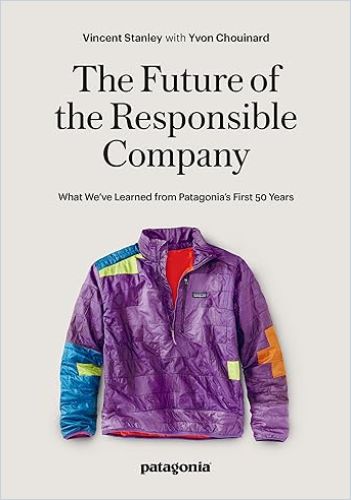Patagonia’s Vincent Stanley and Yvon Chouinard detail their company’s philosophy: Sound environmental practices lead to sustained profitability.

The Aware Organization
Vincent Stanley, Patagonia’s director of philosophy – writing with the company’s founder Yvon Chouinard – describes how it has remained environmentally sound and profitable for half a century.
Benefit the Earth
Businesses must function ethically, even amid a whirlwind of environmental and social crises. Clearly, authors Stanley and Chouinard have given business ethics and Earth’s crises a lot of thought. Since the 19th century, they recount, humanity has created vast numbers of industrial chemicals that pollute waterways and enter the bodies of people and animals. Carbon dioxide in the atmosphere drives global warming and extreme weather. Earth’s sixth and ongoing major extinction event means that species are vanishing at 1,000 times the speed scientists have identified as normal.
Everyone working at every level has to face the unintended consequences of a 250-year-old industrial model that can no longer be sustained ecologically, socially, or financially.Vincent Stanley and Yvon Chouinard
Today’s industrialized societies associate economic well-being with robust consumer spending and continual growth, resulting in the proliferation of ever-cheaper, lower-quality goods. The authors warn that the world will inevitably transition into a “post-consumerist” society. In that setting, companies that produce fewer, higher-quality products will thrive.
Business values
Ensuring profitable results does not require compromising your company’s values or harming the planet. The authors contend that the business community should develop a method of accounting not only for its profits, but also for how an organization’s operations benefit its employees, society, and the natural world.
In Patagonia’s experience, choosing the path that fulfills social and environmental goals also benefits the bottom line. The authors have found that such “constraints” fuel innovations that earn shoppers’ loyalty. They advise companies to be transparent about their financial data and empower their employees to organize their own workflow. Patagonia emphasizes an informal culture and offers flextime, health insurance, parental leave, and on-site child care.
[A business] cannot honor its other responsibilities unless it meets its first responsibility: to be financially fit.
Vincent Stanley and Yvon Chouinard
In 1999, Patagonia’s leaders joined a task force looking for ways to improve conditions for garment factory workers. This led to the creation of the nonprofit Fair Labor Association, which monitors working conditions and wages worldwide. Patagonia formed partnerships with the Fair Trade USA organization and Bluesign Technologies, which audits suppliers’ environmental impact.
Modern companies must meet increasing customer demands for long-lasting, repairable, recyclable products. As Chouinard and Stanley see it, businesses should be transparent about how they make their goods and ensure their durability. That’s the role of the “Our Footprint” section of Patagonia’s website, which provides customers, NGOs, suppliers, and employees with information on the company’s environmental impact.
Companies should educate their customers and their community about how to extend the life of their products and what to do with them when they wear out. A company’s community includes its staff, stakeholders, and suppliers as well as the people and organizations in its local orbit. It should pay local taxes and offer financial and in-kind contributions to the community’s hospitals, schools, and other institutions.And if a company must cease operations in a town where it has been active, it should provide its employees with severance pay and support the local institutions that help the unemployed.
Reduce the harm
Abide by the “precautionary principle,” which is now part of the law in the European Union and elsewhere. It states that when there is no scientific consensus on whether a new technology or product is safe, a business must do its own research and develop that assurance.
The textile industry — which provides Patagonia with raw materials — is second only to farming in its use of chemicals, making it the top polluter of fresh water. Patagonia switched to organic cotton after learning about the environmental harm of conventional cotton production, which relies on fertilizers and insecticides. Although organic cotton farming doesn’t help rebuild the soil, it also doesn’t add chemicals to the land.
Adopt a smaller, more focused scale of production to minimize your company’s environmental harm. Make your products more durable and repairable to reduce waste and improve your financial and environmental impact. Design each product so that at the end of its useful life, people can use its parts and materials to make new products. Patagonia avoids overproduction and tries to deter excess consumption.
Patagonia emphasizes the environmental maxim, “reduce, repair, reuse, recycle.” It has established a marketplace through which customers can sell its used products. The company seeks to use only recycled or renewable materials.
Meaningful Work
Stanley and Chouinard are confident that you and your company can help reverse the damage that has been done to the Earth. They suggest writing letters to defend environmental treaties, such as the Paris Agreement, the UN Sustainable Development Goals, and the 2021 initiative “30 x 30,” which aims to restore 30% percent of the Earth’s habitats by 2030. Those who work in urban planning, law, public health, science, philosophy, business, and related fields can contribute through the work they do.
The task for all of us during the next half-century will be to scale the industrial model down rather than up.Vincent Stanley and Yvon Chouinard
Circular economies help industry provide solutions to climate change, biodiversity loss, waste, and pollution. The authors touch on many environmental concerns, from wind and solar power generation and the need to develop robust power storage technology to regenerative farming, which avoids harmful chemicals and uses crop rotation, companion planting and other techniques to replenish topsoil. They explain that wider adoption of regenerative organic agriculture could revive communities damaged by industrial agriculture.By organizing into cooperative networks, they write, farms and other small-scale businesses could come to the aid of their local communities.
The Best Way
Vincent Stanley, Patagonia’s director of philosophy and a Yale Center for Business and Environment resident fellow, and Yvon Chouinard, founder of Patagonia and Patagonia Provisions, detail how their company reduces its use of environmentally damaging raw materials, makes sure that its suppliers follow fair labor practices, and maintains a track record of recycling industrial materials and helping consumers recycle the company’s clothing when it wears out. In the face of climate change and other environmental threats, they assert that businesses must adopt values and practices that protect the Earth and humankind, as well as make a profit. Chouinard and Stanley radiate a pervasive, logical, common-sense sanity. Their clarity of vision and mission — and the actions they’ve taken to support that vision and mission — make them rare islands of truth and worthwhile action in a marketplace far more prone to destruction.










